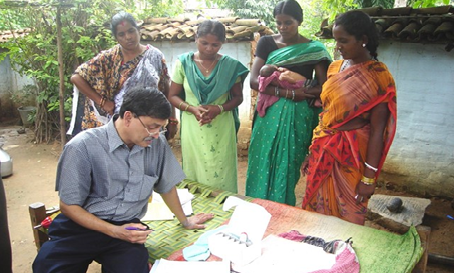Thousands of infants die due to infections in the first few weeks of their life. A bulk of these deaths can be prevented with an inexpensive probiotic-based preventive therapy developed by a group of Indian and American scientists. Tests of the therapy show probiotic when given orally for one week after birth can reduce sepsis and death by 40 percent.
Bhubaneswar (ISW) – Thousands of infants die due to infections in the first few weeks of their life. A bulk of these deaths can be prevented with an inexpensive probiotic-based preventive therapy developed by a group of Indian and American scientists.
The therapy has been tested in over 4,500 infants from 149 villages in Odisha. Results of this trial, published in the latest edition of international journal Nature, show that the probiotic when given orally for one week after birth can reduce sepsis and death by 40 percent. In addition, it also drastically reduces respiratory tract infections. This is the largest ever clinical study of probiotics conducted among new born babies.
Sepsis is a severe complication of bacterial infection that results in around one million infant deaths globally every year.
The preventive therapy is called synbiotic treatment – a combination of probiotic bacteria and a prebiotic nutrient to support the probiotic strain. While probiotics are live micro¬organisms that can provide a health ben¬efit, prebiotics are molecules such as certain carbohydrates in human milk or those derived from plants.
In the Odisha study, the synbiotic prepara¬tion was given daily for one week to full-term born babies when they were two to four days old. The oral preparation contained Lactobacillus plantarum, which had earlier been found to have shown good gut-colonizing properties in newborns, along with fructooligosaccharide, a plant-derived prebiotic.
The therapy was given in addition to breast milk which is known to contain prebiotics as well as other molecules that provide immunity to babies. Only mothers who had started breast feeding their children in their first 24 hours were included in the study.
Follow-up showed that the therapy reduced the risk of sepsis or death by 40 percent. Substan¬tial reductions were seen in all three subtypes of sepsis assessed, and reductions were also observed in diarrhea and umbilical-stump infection in infants who had not been classified as having sepsis.
“This will reduce the nagging high neonatal mortality and infant mortality in developing countries. More importantly, reduction of such infections during infancy can prevent ‘stunting’ with even more grievous consequences such as reduced cognition and chances of chronic diseases such as hypertension and diabetes in early adulthood,” said Pinaki Panigrahi of University of Nebraska Medical Center, who led the research team. He said it is an affordable intervention as one-week therapy costs just one dollar.
“The trial provides evidence for the effectiveness of a global health interven¬tion that could be used to complement exist¬ing strategies for giving every newborn the best chance to survive and thrive,” pointed out Daniel J. Tancredi of University of California, in a commentary published in the same issue of Nature.
Among the institutes that participated in this study are the All India Institute of Medical Sciences, New Delhi; Asian Institute of Public Health, Bhubaneswar; Capital Hospital, Bhubaneswar; SCB Medical College, Cuttack; and Ispat General Hospital, Rourkela, besides Universities of Nebraska, Michigan and Maryland. The community-based trial recruited local volunteers to coordinate follow up.


